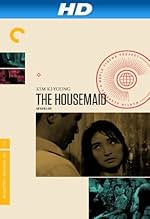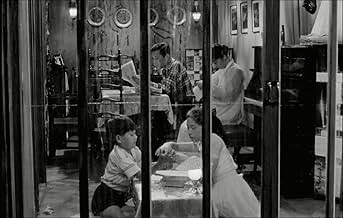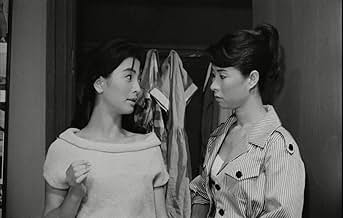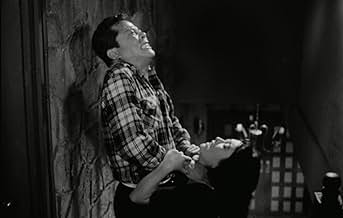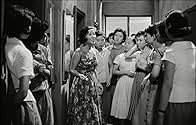IMDb RATING
7.2/10
6.3K
YOUR RATING
A composer and his wife are thrown into turmoil when a housemaid becomes more than they bargained for.A composer and his wife are thrown into turmoil when a housemaid becomes more than they bargained for.A composer and his wife are thrown into turmoil when a housemaid becomes more than they bargained for.
Kim Jin-kyu
- Dong-sik Kim
- (as Jin Kyu Kim)
Ahn Sung-ki
- Chang-soon Kim
- (as Sung-kee Ahn)
- Director
- Writer
- All cast & crew
- Production, box office & more at IMDbPro
Featured reviews
Suicides, attempted suicides, blackmail, murder, attempted murder, adultery, paranoia -- the goings-on in this bizarre and fascinating melodrama put even MANJI to shame.
No wonder one critic calls director Kim "Douglas Sirk on acid" -- while Western audiences may laugh at some of the overheated melodrama, this potboiler nonetheless is pretty wild for 1960, and manages to be both lurid and unforgettable. (It's also got one of the great death scenes *ever* -- see for yourself!)
No wonder one critic calls director Kim "Douglas Sirk on acid" -- while Western audiences may laugh at some of the overheated melodrama, this potboiler nonetheless is pretty wild for 1960, and manages to be both lurid and unforgettable. (It's also got one of the great death scenes *ever* -- see for yourself!)
Ki-young Kim's "The Housemaid" proved an interesting viewing experience for me, in that it ultimately differed very much from what I had come to expect about a half hour into the film. What we appear to have here is another film like Joseph Losey's "The Servant", which was a left-wing, revolutionary exercise in which a lower class man enters an upper class household as a servant, and ultimately takes over the bourgeois home, throwing it into upheaval and chaos. Likewise, in "The Housemaid", a young woman joins a wealthier household as a maid, and instantly things begin to take a turn toward disorder and familial disintegration. It could easily be a revolutionary, communist film like Losey's. It is not.
In fact, it is the polar opposite. It turns out that "The Housemaid" is actually an overtly conservative film. This film is undebatably a defense of traditional family values like faithfulness, fidelity, and monogamy. Another film with a virtually identical plot could have just as easily been an attack on those same values. In "The Housemaid", however, the character of the maid is not the instrument of revolution, the hand of Marxist justice that has come to wipe out every trace of bourgeois society from our microcosmic household (e.g. Dirk Bogarde's character in "The Servant"); rather, she is the face of temptation, the tantalizer that will be the destruction of a healthy, happy family, should the patriarchal figure fall into that inescapable abyss of adultery.
Some viewers have interpreted the film in other ways, though I don't see how they could. This isn't that kind of film. There really isn't anything ambiguous here. The only exception — the one place where interpretation of the film's message might become a bit convoluted — is the framing device that Kim uses at the film's bookends. I would note the likelihood that this was added for the sake of the censors. After all, it is somewhat surprising that Kim got this film passed in the first place, and the frame story, which abruptly obliterates the reality of the film's central storyline, may have been the only reason he was able to do so. Despite my usual partiality for any kind of narrative complexity or nonlinear structure, I felt this device was mildly detrimental to the film's integrity. Regardless, it really doesn't change anything about the nature of the film's message.
Thematically, the key moment in the film comes fairly early on, immediately after the decisive act of infidelity. Kim goes to great lengths to underline this instant as the pivotal moment in the lives of his characters, a moment from which there will be no return. He achieves this rather heavy-handedly, by cutting away from the room in which the action occurs, to a shot of a large tree standing outside the house, which is immediately struck by lightning, as if to make it abundantly clear, written in Fuller-esque boldface type: This is the moment that changes everything! This is the undoing of a family!
It's not a subtle film, needless to say. There are, however, master touches throughout. The cinematography is certainly impressive, as is Kim's direction. The laterally panning shots through the plate glass on the upper floor of the house are fantastic. It is quite a well shot film, and Kim works inspiringly within the limited space of only a few settings.
Dramatically, however, "The Housemaid" was somewhat disappointing. The film can't decide whether it wants to be a Buñuelian art film or a Hitchcockian thriller, and the resulting blend is very uneven, increasingly as the film progresses. Kim never gives this film any real, constant identity. The score was quite poor. With its obtrusive and highly transparent attempts at creating tension and coercing the viewer into a certain emotion, it never ceased to intrude on the viewing experience.
This may be a political film — it certainly has a plainly conservative message — but if it is, it's not because Kim intended it to be. Despite being pressured by his government to foray into political filmmaking on a few occasions, Kim himself was not particularly interested in politics. He once said, "North or south, capitalist or communist, ideology is far less interesting to me than the things that divide the sexes."
Indeed, this is evident in "The Housemaid". Kim is clearly much more interested in the boundaries and barriers between men and women — the impediments that obstruct the path to intimacy and healthy relationships — than he is in any specific political ideology. And this is where the film regains some of its composure. Comparisons have been made to the work of Luis Buñuel and Shôhei Imamura. I can see it, in terms of its portrayal of passion and conflicted attempts at intimacy between the sexes, but on the whole I think those are pretty loose comparisons. "The Housemaid" works best as a psychological drama. When we analyze the motives of the characters, and what drives each of them toward their respective actions, the film comes into focus fairly nicely. When it tries to move into suspense, however, it looses its momentum as a drama, and as a successful, cohesive work of cinema.
All things considered, I think this is a good film. I can't call it a masterpiece, or even a great film, although I know many feel that way about it, but I do think it's quality cinema that's worth seeing. My biggest complaint with the film is its extreme lack of subtlety, in multiple facets of the art of filmmaking. Dramatically, "The Housemaid" goes way over the top one too many times, and thematically, the film essentially boils down to a cautionary tale about adultery and infidelity. Nonetheless, it's a film that deserves to be seen, especially with the relatively small place that South Korea occupies in the cinematic landscape.
RATING: 7.33 out of 10
In fact, it is the polar opposite. It turns out that "The Housemaid" is actually an overtly conservative film. This film is undebatably a defense of traditional family values like faithfulness, fidelity, and monogamy. Another film with a virtually identical plot could have just as easily been an attack on those same values. In "The Housemaid", however, the character of the maid is not the instrument of revolution, the hand of Marxist justice that has come to wipe out every trace of bourgeois society from our microcosmic household (e.g. Dirk Bogarde's character in "The Servant"); rather, she is the face of temptation, the tantalizer that will be the destruction of a healthy, happy family, should the patriarchal figure fall into that inescapable abyss of adultery.
Some viewers have interpreted the film in other ways, though I don't see how they could. This isn't that kind of film. There really isn't anything ambiguous here. The only exception — the one place where interpretation of the film's message might become a bit convoluted — is the framing device that Kim uses at the film's bookends. I would note the likelihood that this was added for the sake of the censors. After all, it is somewhat surprising that Kim got this film passed in the first place, and the frame story, which abruptly obliterates the reality of the film's central storyline, may have been the only reason he was able to do so. Despite my usual partiality for any kind of narrative complexity or nonlinear structure, I felt this device was mildly detrimental to the film's integrity. Regardless, it really doesn't change anything about the nature of the film's message.
Thematically, the key moment in the film comes fairly early on, immediately after the decisive act of infidelity. Kim goes to great lengths to underline this instant as the pivotal moment in the lives of his characters, a moment from which there will be no return. He achieves this rather heavy-handedly, by cutting away from the room in which the action occurs, to a shot of a large tree standing outside the house, which is immediately struck by lightning, as if to make it abundantly clear, written in Fuller-esque boldface type: This is the moment that changes everything! This is the undoing of a family!
It's not a subtle film, needless to say. There are, however, master touches throughout. The cinematography is certainly impressive, as is Kim's direction. The laterally panning shots through the plate glass on the upper floor of the house are fantastic. It is quite a well shot film, and Kim works inspiringly within the limited space of only a few settings.
Dramatically, however, "The Housemaid" was somewhat disappointing. The film can't decide whether it wants to be a Buñuelian art film or a Hitchcockian thriller, and the resulting blend is very uneven, increasingly as the film progresses. Kim never gives this film any real, constant identity. The score was quite poor. With its obtrusive and highly transparent attempts at creating tension and coercing the viewer into a certain emotion, it never ceased to intrude on the viewing experience.
This may be a political film — it certainly has a plainly conservative message — but if it is, it's not because Kim intended it to be. Despite being pressured by his government to foray into political filmmaking on a few occasions, Kim himself was not particularly interested in politics. He once said, "North or south, capitalist or communist, ideology is far less interesting to me than the things that divide the sexes."
Indeed, this is evident in "The Housemaid". Kim is clearly much more interested in the boundaries and barriers between men and women — the impediments that obstruct the path to intimacy and healthy relationships — than he is in any specific political ideology. And this is where the film regains some of its composure. Comparisons have been made to the work of Luis Buñuel and Shôhei Imamura. I can see it, in terms of its portrayal of passion and conflicted attempts at intimacy between the sexes, but on the whole I think those are pretty loose comparisons. "The Housemaid" works best as a psychological drama. When we analyze the motives of the characters, and what drives each of them toward their respective actions, the film comes into focus fairly nicely. When it tries to move into suspense, however, it looses its momentum as a drama, and as a successful, cohesive work of cinema.
All things considered, I think this is a good film. I can't call it a masterpiece, or even a great film, although I know many feel that way about it, but I do think it's quality cinema that's worth seeing. My biggest complaint with the film is its extreme lack of subtlety, in multiple facets of the art of filmmaking. Dramatically, "The Housemaid" goes way over the top one too many times, and thematically, the film essentially boils down to a cautionary tale about adultery and infidelity. Nonetheless, it's a film that deserves to be seen, especially with the relatively small place that South Korea occupies in the cinematic landscape.
RATING: 7.33 out of 10
I haven't seen before melodrama as stunning, shocking, utterly ridiculous and in full knowledge of it, Korea's cautionary tale answer on marital infidelity to Reefer Madness if it weren't at the same time as cinematically vibrant and obstinate as the best works of Sam Fuller, driven by suspenseful will and heavy with undertones of something at once sinister and horrifying to make you think parts of it were destined at some point for Les Diaboliques or Whatever Happened to Baby Jane, as Ki-young Kim's The Housemaid; for all intents and purposes, this is melodrama a-go-go, not in the cosmopolitan sense of the term, but ironic and campy, a dazzling movie steeped in artifice and insanely interesting human behaviour that sets out to provoke and push common sense to a limit.
A well to do couple hires a maid to help out the wife with the chores around the house, but no sooner has she gone into the kitchen to get a glass of water than the entire household threatens to collapse in ruins of rat poison and unwanted pregnancies, illicit thrysts and alliances striken casually and alternatively between the wife and the maid who is now a mistress, the wife and the husband against the maid who they need to be rid off before she talks of the affair, the maid and the husband against each other and their own selves.
The other movie I've seen by Ki-young Kim is, Iodo, a Korean version of The Wicker Man that takes place in a remote island populated exclusively by fisherwomen. It was also utterly bonkers, the most outrageous plotting this side of Italian exploitation, but it lacked the ability to see that in itself, to recognize the madness and defy it. The Housemaid at first seems like the product of Ed Wood incompetence. Some of the dialogue and character behavior had me in stitches. But it soon reveals that to be a facade which the movie can lift and put back in place at whim, so that it can be all things to all people not because of any particular notion of ambiguity shared by Ki-young Kim because the movie is blunt like a hammer in the face, but because it doesn't abide by any notion of common sense or realism unless it wants to. The movie behaves with the same audacity of its maid protagonist. It sets up an image of a socially upwards mobile household where a couple can afford to buy a television even if it means hours of slaving away on a sewing machine to get it, and then affronts it violently, perversely toys with it and corrupts it to the heart.
In the end, if any more clue was required, we get fourth walls broken and a man winking straight at us. This is Panic Theater at its best, with the selfaware avant-garde tropes replaced by unselfconscious soap opera clichés.
A well to do couple hires a maid to help out the wife with the chores around the house, but no sooner has she gone into the kitchen to get a glass of water than the entire household threatens to collapse in ruins of rat poison and unwanted pregnancies, illicit thrysts and alliances striken casually and alternatively between the wife and the maid who is now a mistress, the wife and the husband against the maid who they need to be rid off before she talks of the affair, the maid and the husband against each other and their own selves.
The other movie I've seen by Ki-young Kim is, Iodo, a Korean version of The Wicker Man that takes place in a remote island populated exclusively by fisherwomen. It was also utterly bonkers, the most outrageous plotting this side of Italian exploitation, but it lacked the ability to see that in itself, to recognize the madness and defy it. The Housemaid at first seems like the product of Ed Wood incompetence. Some of the dialogue and character behavior had me in stitches. But it soon reveals that to be a facade which the movie can lift and put back in place at whim, so that it can be all things to all people not because of any particular notion of ambiguity shared by Ki-young Kim because the movie is blunt like a hammer in the face, but because it doesn't abide by any notion of common sense or realism unless it wants to. The movie behaves with the same audacity of its maid protagonist. It sets up an image of a socially upwards mobile household where a couple can afford to buy a television even if it means hours of slaving away on a sewing machine to get it, and then affronts it violently, perversely toys with it and corrupts it to the heart.
In the end, if any more clue was required, we get fourth walls broken and a man winking straight at us. This is Panic Theater at its best, with the selfaware avant-garde tropes replaced by unselfconscious soap opera clichés.
An interesting mix of film noir, melodrama, and morality tale, which also does a good job of keeping the audience off-balance. There may also be some social commentary in here relative to class and making us wonder to what lengths someone will go to preserve their reputation and upward mobility, but I think these were in a minor key, even if the film does bring Parasite to mind. There is something mythical about how this woman manages to invert the whole order of this house, and yet it's also got moments that are intensely dramatic and real, and that was interesting. The threat always seems clear and present to us, because the housemaid (Lee Eun-shim) seems a little off, there are constant trips to the cupboard with rat poison, and the family has a couple of kids. The character actions never quite seem to make sense which worked against it for me, but that's a part of what works the audience up into a frenzy, and keeps it a wild ride.
The acting in the film is unfortunately not one of its highlights, but Lee Eun-shim certainly is striking in the shots of her glaring through the window, and sultry when she's getting intimate with her boss (Kim Jin-kyu). I liked the shot of her bare feet stepping up onto his shoes, followed by the one of his back as her arms circled around him, and in a later scene when her calf sinuously winding around his - they capture the seduction well. Less successful were the cliché, heavy-handed moments, like the lightning hitting a tree after the first infidelity (it made me think of the cliché opening to a novel, It was a dark and stormy night....). The cinematography is pretty nice, though I wish it hadn't been as confined and given a little more freedom.
At its bottom though, this is a conservative film about the importance of family and avoiding the female temptress, which is an age old and tired theme. And even if the man can't manage that, well, his wife should shoulder some blame, and in this case, she does, for having wanted a bigger house (ugh). It was for this reason and for the unevenness in the character motivations that I didn't rate the film higher, but it was certainly entertaining, and definitely had camp appeal.
Quote: "Where are you going?" "Your daddy is going to sleep with me tonight."
The acting in the film is unfortunately not one of its highlights, but Lee Eun-shim certainly is striking in the shots of her glaring through the window, and sultry when she's getting intimate with her boss (Kim Jin-kyu). I liked the shot of her bare feet stepping up onto his shoes, followed by the one of his back as her arms circled around him, and in a later scene when her calf sinuously winding around his - they capture the seduction well. Less successful were the cliché, heavy-handed moments, like the lightning hitting a tree after the first infidelity (it made me think of the cliché opening to a novel, It was a dark and stormy night....). The cinematography is pretty nice, though I wish it hadn't been as confined and given a little more freedom.
At its bottom though, this is a conservative film about the importance of family and avoiding the female temptress, which is an age old and tired theme. And even if the man can't manage that, well, his wife should shoulder some blame, and in this case, she does, for having wanted a bigger house (ugh). It was for this reason and for the unevenness in the character motivations that I didn't rate the film higher, but it was certainly entertaining, and definitely had camp appeal.
Quote: "Where are you going?" "Your daddy is going to sleep with me tonight."
Not a perfect film, but certainly an intriguing and timely one, coming out at a time when films around the world were breaking boundaries and pushing their subject matter to the next level - think PSYCHO and PEEPING TOM, for instance. This distinctly Korean movie takes a look at issues involving class, gender roles, family dynamics and social norms, all set in a middle class household where the arrival of the titular character explodes tensions and invokes horror all round. Well shot and very well acted, this is occasionally dated and melodramatic, a little slow at times, with an ending that doesn't quite work, but otherwise it's well worth a look.
Did you know
- TriviaThis was the first and the last film Eun-shim Lee (Myung-sook) starred in. The public hated immoral Myung-sook so much that no director hired her after this film. [She may not have had a starring role, but she was hired for two films after this movie and also appeared in one movie previously.]
- Goofs(at around 1h 29 mins) The girl, Ae-soon, gets out of bed surprisingly quickly and effortlessly for a young woman needing crutches.
- Quotes
Dong-sik Kim: What does the law state about a man who cheats on his wife?
Lyu: [laughs] Sometimes he can get a lighter sentence than for a traffic violation. Once his wife forgives him, he's acquitted. Just as you wouldn't tell your son you're a murderer of a thief, even between couples some things should be kept secret.
- ConnectionsFeatured in L'ivresse de l'argent (2012)
- How long is The Housemaid?Powered by Alexa
- What does the "two men eat" comment mean?
- Does HANYO's reputation guarantee its preservation?
- How can I see the complete HANYO?
Details
- Runtime1 hour 49 minutes
- Color
- Sound mix
- Aspect ratio
- 1.37 : 1
Contribute to this page
Suggest an edit or add missing content


